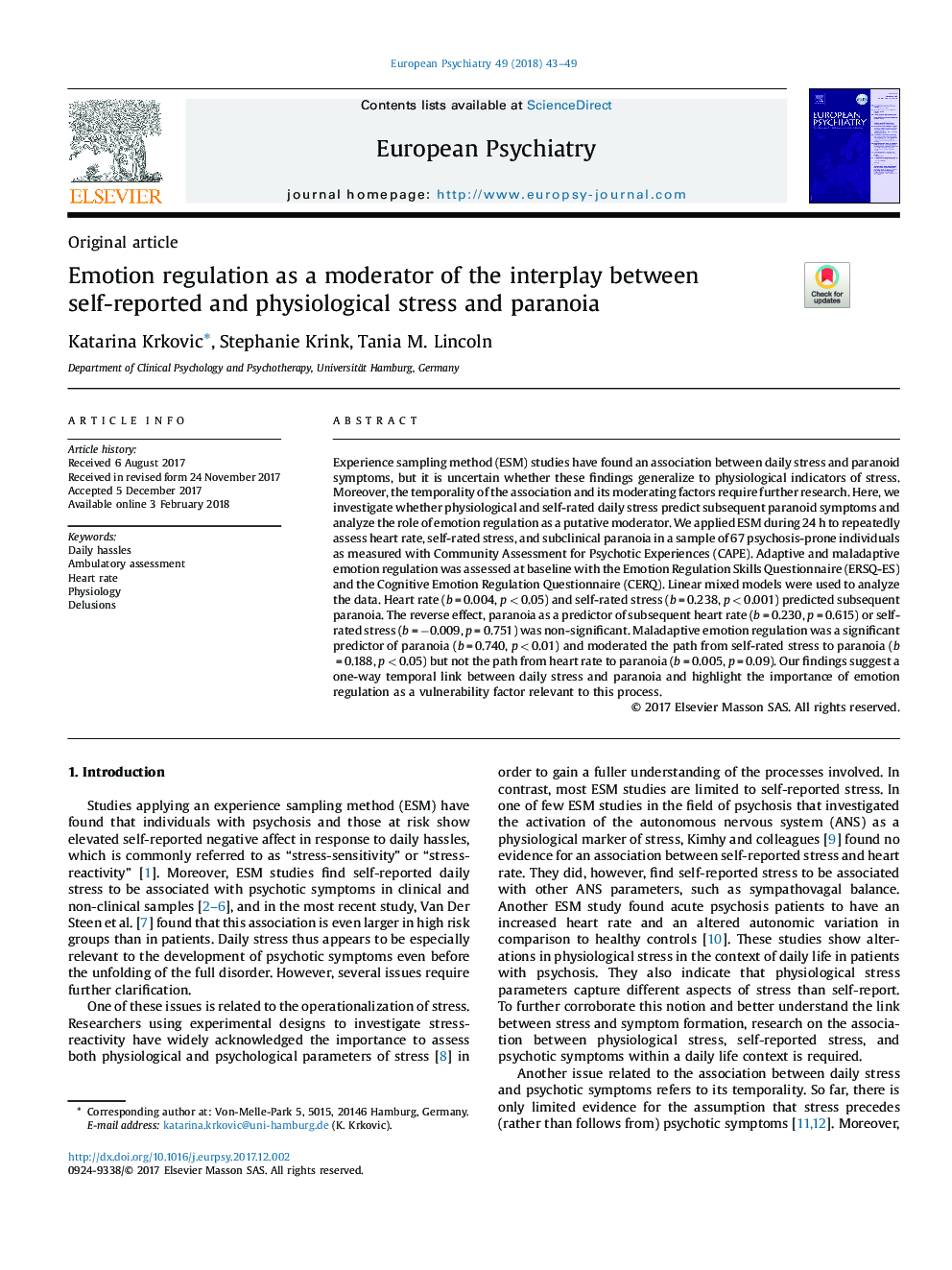| کد مقاله | کد نشریه | سال انتشار | مقاله انگلیسی | نسخه تمام متن |
|---|---|---|---|---|
| 8814847 | 1608040 | 2018 | 7 صفحه PDF | دانلود رایگان |
عنوان انگلیسی مقاله ISI
Emotion regulation as a moderator of the interplay between self-reported and physiological stress and paranoia
ترجمه فارسی عنوان
مقررات عاطفی به عنوان مداخله کننده ای از تعامل بین استرس فیزیولوژیک و خود گزارش شده و پارانویا
دانلود مقاله + سفارش ترجمه
دانلود مقاله ISI انگلیسی
رایگان برای ایرانیان
کلمات کلیدی
روزنامه های عجیب و غریب، ارزیابی آماری، ضربان قلب، فیزیولوژی، اتهامات
موضوعات مرتبط
علوم پزشکی و سلامت
پزشکی و دندانپزشکی
روانپزشکی و بهداشت روانی
چکیده انگلیسی
Experience sampling method (ESM) studies have found an association between daily stress and paranoid symptoms, but it is uncertain whether these findings generalize to physiological indicators of stress. Moreover, the temporality of the association and its moderating factors require further research. Here, we investigate whether physiological and self-rated daily stress predict subsequent paranoid symptoms and analyze the role of emotion regulation as a putative moderator. We applied ESM during 24â¯h to repeatedly assess heart rate, self-rated stress, and subclinical paranoia in a sample of 67 psychosis-prone individuals as measured with Community Assessment for Psychotic Experiences (CAPE). Adaptive and maladaptive emotion regulation was assessed at baseline with the Emotion Regulation Skills Questionnaire (ERSQ-ES) and the Cognitive Emotion Regulation Questionnaire (CERQ). Linear mixed models were used to analyze the data. Heart rate (bâ¯=â¯0.004, pâ¯<â¯0.05) and self-rated stress (bâ¯=â¯0.238, pâ¯<â¯0.001) predicted subsequent paranoia. The reverse effect, paranoia as a predictor of subsequent heart rate (bâ¯=â¯0.230, pâ¯=â¯0.615) or self-rated stress (bâ¯=â¯â0.009, pâ¯=â¯0.751) was non-significant. Maladaptive emotion regulation was a significant predictor of paranoia (bâ¯=â¯0.740, pâ¯<â¯0.01) and moderated the path from self-rated stress to paranoia (bâ¯=â¯0.188, pâ¯<â¯0.05) but not the path from heart rate to paranoia (bâ¯=â¯0.005, pâ¯=â¯0.09). Our findings suggest a one-way temporal link between daily stress and paranoia and highlight the importance of emotion regulation as a vulnerability factor relevant to this process.
ناشر
Database: Elsevier - ScienceDirect (ساینس دایرکت)
Journal: European Psychiatry - Volume 49, March 2018, Pages 43-49
Journal: European Psychiatry - Volume 49, March 2018, Pages 43-49
نویسندگان
Katarina Krkovic, Stephanie Krink, Tania M. Lincoln,
